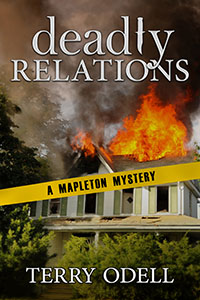Are you Lying or Laying Around
Terry Odell
 Analytics from my own website/blog shows that consistently, one of the top three search terms (after my name) ended up on a basic grammar post I did a number of years ago. If that many people were searching, I thought some of our TKZ readers might find it useful. If you’ve already got a handle on the usage, enjoy the picture of the cat.
Analytics from my own website/blog shows that consistently, one of the top three search terms (after my name) ended up on a basic grammar post I did a number of years ago. If that many people were searching, I thought some of our TKZ readers might find it useful. If you’ve already got a handle on the usage, enjoy the picture of the cat.
Years ago, when I was tutoring for the Adult Literacy League in Orlando, one of my students was a native Korean speaker. She’d been in the US for almost two decades, but she needed a lot of help with grammar. I relied on a book my kids had used in elementary school, Scholastic’s A+ Guide to Grammar by Vicki Tyler. I don’t think you can find it anymore, and I’m glad I kept the book. The pages are yellowing, but it’s a great quick reference, explained in easy to understand terms.
One problem my student had, and one that I still see when evaluating manuscripts, is the “Lie vs Lay” usage. So, here’s your grammar tip for today:
LIE (Not the fib-telling usage)
Means to rest or recline, and also to remain or be situated.
NEVER takes a direct object.
LAY
Means to put or place something.
Usually takes a direct object that tells what was placed
Confusion arises when you change tenses.
LIE is present tense. Past is LAY
LAY is present tense. Past is LAID.
Here are some examples in a variety of tenses which might clarify things. Or give you something to refer to.
LIE
- If you’re tired, lie down and take a nap
- I wonder what lies beneath the pile of clothes in my closet.
- Your sweater is lying on the couch
- Last summer, we lay by the pool every day after lunch
- The envelope from my sister lay unopened for a week
- I have lain in bed all morning
LAY
- Lay the grocery bag on the table
- I was laying the new hardwood floor in the dining room.
- I laid the grocery bags on the table before I answered the phone.
- I have laid my cards on the table.
So, in answer to the question posed in the title of this post — you’re lying around.
I don’t know if this helps. I tend to rely on the “takes an object” rule if I’m not sure. Of course, there’s always the write-around option. Use a different word!
What about you? Any grammar issues you have to stop and think about? Any you’ve noticed while reading?
Image by Mabel Amber from Pixabay
 Available for Pre-Order
Available for Pre-Order
Paperback format available now.
Deadly Relations.
Nothing Ever Happens in Mapleton … Until it Does
Gordon Hepler, Mapleton, Colorado’s Police Chief, is called away from a quiet Sunday with his wife to an emergency situation at the home he’s planning to sell. A man has chained himself to the front porch, threatening to set off an explosive.
 Terry Odell is an award-winning author of Mystery and Romantic Suspense, although she prefers to think of them all as “Mysteries with Relationships.”
Terry Odell is an award-winning author of Mystery and Romantic Suspense, although she prefers to think of them all as “Mysteries with Relationships.”
